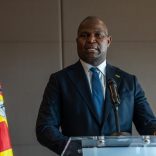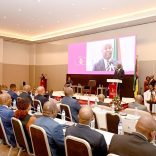Mozambique: Government to establish new agency for road accident prevention and investigation – ...
CIP Mozambique Elections: Politicians in Strasbourg and diplomats in Maputo see a different Mozambique

File photo: Lusa
The perception gap between diplomats in Maputo and their bosses in European capitals is growing. This was shown by an emergency debate on Mozambique in the European parliament on 26 November, which was very cautious. By contrast, the joint statement the next day by five embassies in Maputo – Norway, Switzerland, Canada, UK, and US – strongly condemned the escalating violence against civilians. (See bulletin 343 https://bit.ly/Moz-El-343)
The short debate at the European Parliament in Strasbourg had statements lasting one minute by MEPs from the various factions.(All statements on https://www.europarl.europa.eu/plenary/en/home.html ) Those who had taken part in election observation missions spoke very emotionally about the events of the past few weeks, but their contributions showed little knowledge of the background and current political situation.
Laura Ballarín Cereza of the Spanish PS, who led the election observation mission, called for the Constitutional Council to analyse the appeals submitted. She also reiterated the observer demand that the CNE publish results broken down by polling station. Finally she said the right to peaceful demonstration must be respected, that excessive use of force be avoided, and that all parties refrain from using inflammatory rhetoric.
MEP João Oliveira, for the Portuguese Communist Party, described the debate as superfluous and clearly sided with the Mozambican government.
Cabo Delgado took a prominent place in the statements. The only speaker to be highly critical of the EU military training mission was the representative of the French far right, Rassemblement national (Rody Tolassy), who put his finger on the problem:
“Rename a mission and allocate a further €14 million for military training that is already inadequate. But where is the effectiveness and where are the results?
Millions of euros have been invested since 2021, and yet the situation continues to worsen.”
Marie Toussant, the representative of the French Green Party, cited recent research which showed that the Mozambican army massacred 150 prisoners at the TOTAL site in Cabo Delgado in July 2021, and called on the EU to demand an international investigation. “This bloodbath was perpetrated by the Mozambican army operating in a gas field managed by Europe’s largest oil and gas company, Total Energy. Total knew, but let it happen.” https://bit.ly/Moz-643
Many contributions condemned the security forces’ use of violence against the demonstrators, but without attacking the government or calling on it to ensure that these excesses of violence were stopped.
The debate on Mozambique opened with the official position on Mozambique given by Commissioner for Equality, Helena Dalli, on behalf of departing High Representative (EU Foreign Minister) Josep Borrell. “The brutality of the repression from the state apparatus and the police has exacerbated the situation. We deplore the considerable number of fatalities over the past weeks, and we also condemn the assassination of two opposition politicians on 19 October, ” she said. But she also said “I stress that the EU and the Electoral Observation Mission are not taking any sides, and only act on the basis of principles as an important partner and friend of Mozambique, solely in the interest of the Mozambican people.” She ended by saying “We will work with Mozambique in the most constructive way, and in full respect of the EU’s interests and values.”
The EU faces a dilemma regarding Mozambique. The economic “interests” are too great, due to the important natural resources, especially for the energy transition, the special interest of some member states, above all France but also Italy with regard to gas exploitation, the close ties with Portugal and the geostrategic interests, which do not want to leave Mozambique entirely to the influence of China or Russia.
For this reason, the EU is not expected to take a clear position on the election fraud and the current repression by the state apparatus in Mozambique, as it did in the case of Venezuela and is now doing with great clarity in Georgia, where it is even threatening with sanctions.
On 1 December, Estonia’s former prime minister Kaja Kallas took office as the EU’s new foreign policy chief (High Representative). Will she set a different course for Mozambique under the new composition of the EU Commission and a far more right-wing conservative composition of the European Parliament?












Leave a Reply
Be the First to Comment!
You must be logged in to post a comment.
You must be logged in to post a comment.